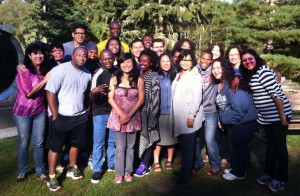
Sayumi Irey, director of the Bellevue College Faculty Commons had a seemingly simple idea: to promote a campus in which the makeup of the faculty and staff mirrors that of the student population they serve.
Simple, but not necessarily easy.
According to the Washington Executive Leadership Academy (WELA), over 80 percent of their ranks are white professionals. Further, data from the Washington State Board of Community and Technical Colleges (SBCTC) points to the discrepancy in terms of Washington’s overall population: 71.6 percent identify as white, while the faculty and staff within the community and technical college system range anywhere from 77 to 89 percent white identifying. And according to the U.S. Department of Labor, Office of Disability Employment Policy, employment for people with disabilities as of November 2014 was 19.7 percent as compared to 68.7 percent for those without disabilities.
Having personally experienced the shortage of people of color in leadership roles in academics, Irey worked with colleagues and administrators to launch the Social Justice Leadership Institute (SJLI) and retreat series to support minority leaders in higher education. The team advocating for the institute grew to include Bellevue College leadership: President David Rule, Ata Karim, vice president of student affairs and Yoshiko Harden, vice president for diversity/ Chief Diversity Officer.
In collaboration with WELA and other leadership programs, the SJLI is now working to create more leaders from diverse backgrounds, employing the culturally equitable and collaborative social justice leadership model. Participants in the SJLI learn about alternative ways of leading that are culturally responsive for the future of community and technical colleges, and connect with various mentors and have ongoing professional networks and opportunities. Most importantly, they will be ready to take more formal leadership positions in community and technical community colleges as they arise.
The SJLI held its inaugural session in the fall of 2014 at the Whidbey Institute. Irey and her colleagues expected six or seven participants. When applications were opened to the 34 community colleges in Washington State, over 30 applicants expressed interest for the 20 available openings. The first cohort includes faculty and employees of color from community colleges all over the state and while recruitment was focused on ethnic minorities, the group is also diverse in gender, sexual orientation and age and will continue to meet throughout the academic year.
“To have an equitable society, we need all members’ voices, not just a majority voice.” Irey said. “While Washington State’s goal is to recruit and mentor members of historically disenfranchised and underrepresented professionals, there is no systemic pipeline in place for them to move into executive leadership positions. This institute serves in part as that pipeline.”
– by Evan Epstein
Last Updated October 3, 2016
